In today’s diverse and inclusive society, ensuring equal access and accommodation for individuals with disabilities is paramount.
For churches and religious institutions, this commitment to accessibility extends beyond moral duty; it’s a legal obligation under the Americans with Disabilities Act (ADA).
The ADA mandates that places of worship must be accessible to all individuals, regardless of their physical or cognitive abilities.
However, achieving ADA compliance often requires substantial financial investment, especially for older church buildings that may lack modern accessibility features.
Recognizing this challenge, various organizations and government entities offer ADA compliance grants for churches to assist them in making their facilities more accessible.
These grants cover a wide range of accessibility improvements, including but not limited to installing ramps, elevators, accessible restroom facilities, handrails, and signage.
By obtaining these grants, churches can ensure that their spaces are welcoming and inclusive for all members of their congregation and the broader community.
In this article, we’ll delve into the intricacies of ADA compliance grants for churches, exploring the types of grants available, eligibility criteria, application processes, and a list of organizations that offer these grants.
Through this comprehensive guide, churches can gain valuable insights into securing the necessary funding to enhance accessibility and create more inclusive environments for worship and community engagement.
What are the ADA Compliance Grants for Churches?
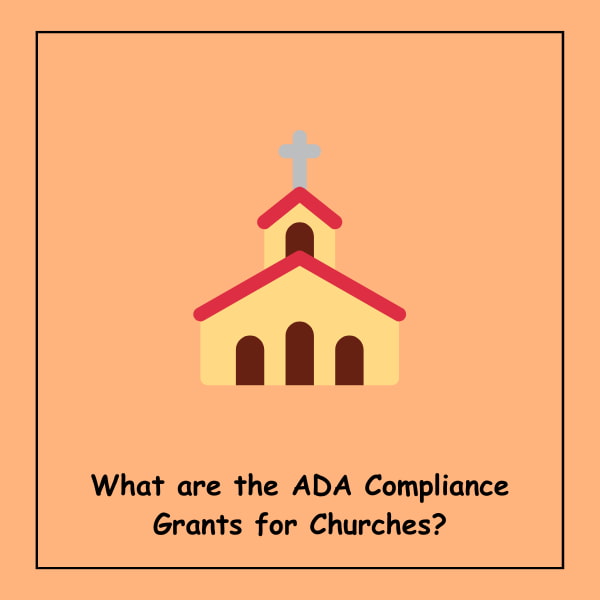
ADA compliance grants for churches encompass various financial aids aimed at assisting religious organizations in making their facilities accessible to individuals with disabilities.
These grants cover a spectrum of accessibility enhancements, including but not limited to grants for elevators in churches, accessibility grants for churches, and specific ADA grants for churches.
They provide funding for implementing ramps, handrails, widened doorways, accessible restroom facilities, signage, and other necessary modifications to ensure compliance with ADA regulations.
Additionally, these grants may support larger-scale projects such as installing elevators or lifts to provide access to different levels of the church building.
The grants cater to the diverse needs of churches, considering factors such as the size of the congregation, the age and architectural design of the building, and the specific accessibility challenges faced by the community.
By securing ADA compliance grants, churches can address the financial challenges associated with achieving ADA compliance and create more inclusive spaces for worship and community engagement, fostering a sense of belonging for all individuals, regardless of their physical abilities.
These grants not only benefit the church community but also align with broader societal goals of promoting accessibility and inclusion, ensuring that everyone has equal access to places of worship and spiritual fulfillment.
How to get ADA Compliance Grants for Churches?
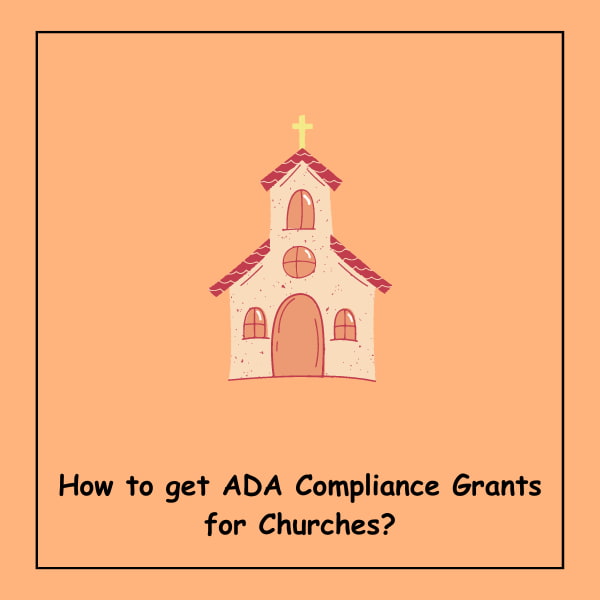
Securing ADA compliance grants for churches involves a comprehensive process that requires careful attention to detail and adherence to specific guidelines.
Firstly, churches must thoroughly research available grant opportunities tailored to their needs.
This includes exploring government agencies, private foundations, and nonprofit organizations that offer grants specifically aimed at promoting accessibility and ADA compliance within religious institutions.
Once potential grant opportunities are identified, churches must assess their eligibility for each program.
Eligibility criteria may vary depending on the granting organization but often include factors such as the church’s nonprofit status, its demonstrated need for accessibility improvements, and its commitment to complying with ADA regulations.
It’s essential for churches to review each grant’s requirements meticulously to ensure they meet all criteria before proceeding with the application process.
Next, churches must gather the necessary documentation to support their grant application.
This typically includes official proof of nonprofit status, detailed architectural plans outlining proposed accessibility renovations or installations, and a comprehensive budget proposal detailing how the grant funds will be allocated.
Additionally, churches may need to provide evidence of community support for the proposed project and demonstrate how it aligns with their mission and objectives.
With all required documents prepared, churches can proceed to complete the grant application forms.
It’s crucial to pay close attention to the instructions provided by the granting organization and ensure that all required information is accurately provided.
Churches may also consider seeking assistance from grant writing professionals or consultants to enhance the quality and competitiveness of their applications.
Once the application is completed, it should be submitted according to the specified deadline.
After submission, churches may need to wait for a period of time while the granting organization reviews and evaluates their application.
During this time, it’s essential to remain proactive and responsive to any inquiries or requests for additional information from the grantor.
Overall, securing ADA compliance grants for churches requires strategic planning, thorough research, and meticulous attention to detail.
By following these steps and actively engaging in the grant application process, churches can increase their chances of successfully obtaining funding to support their accessibility initiatives and create more inclusive environments for worship and community engagement.
Eligibility Criteria for ADA Compliance Grants for Churches
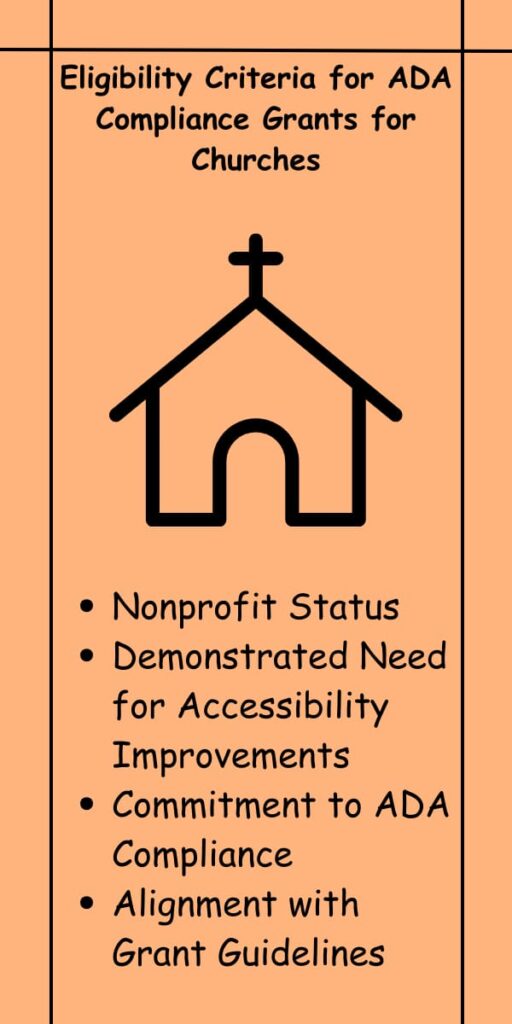
- Nonprofit Status: To qualify for ADA compliance grants for churches, the organization must hold nonprofit status. This status is typically evidenced by official documentation, such as a tax-exempt determination letter from the Internal Revenue Service (IRS) or an equivalent regulatory body.
- Demonstrated Need for Accessibility Improvements: Churches seeking ADA grants must present a clear and compelling case demonstrating the necessity for accessibility enhancements within their facilities. This may involve conducting an accessibility assessment to identify existing barriers and outlining how the proposed renovations or installations will address these challenges.
- Commitment to ADA Compliance: Granting organizations often require churches to articulate their commitment to complying with the regulations set forth in the Americans with Disabilities Act (ADA). This could involve providing a written statement affirming their dedication to ensuring equal access for individuals with disabilities and outlining plans for ongoing compliance efforts.
- Alignment with Grant Guidelines: Churches must ensure that their proposed project aligns with the specific guidelines outlined by the granting organization. This may include restrictions on the types of renovations or installations covered by the grant, geographical limitations on eligible applicants, or requirements related to project timelines and outcomes.
Document Requirements for ADA Compliance Grants for Churches
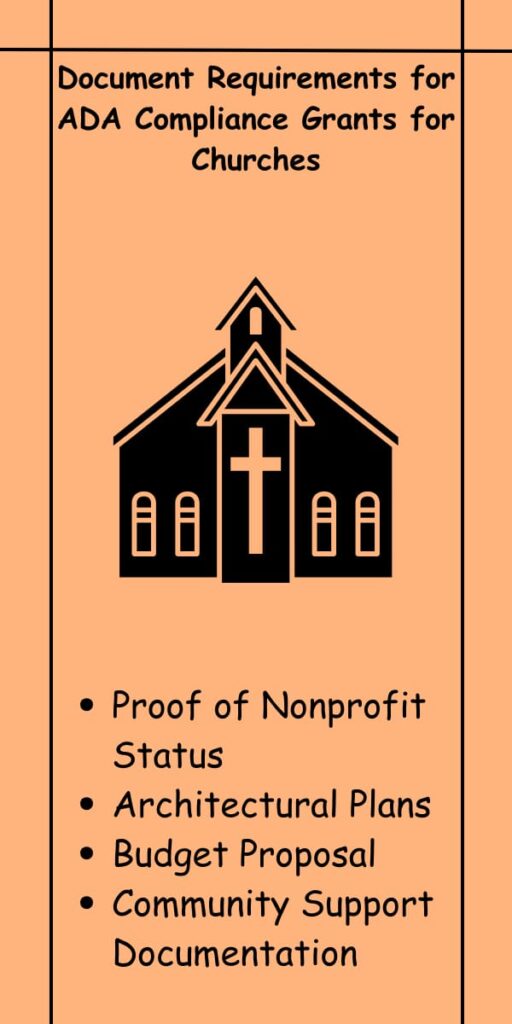
- Proof of Nonprofit Status: Alongside their grant application, churches must provide official documentation proving their nonprofit status. This typically includes a copy of their tax-exempt determination letter from the IRS or equivalent regulatory body, demonstrating their eligibility for charitable funding.
- Architectural Plans: Detailed architectural plans outlining the proposed accessibility renovations or installations are crucial components of the grant application. These plans should be prepared by a qualified professional and clearly illustrate the scope of the project, including any structural modifications or additions required to achieve ADA compliance.
- Budget Proposal: A comprehensive budget proposal is essential for demonstrating the financial feasibility and accountability of the proposed project. This should include detailed cost estimates for materials, labor, permits, and any other associated expenses, along with a breakdown of how the grant funds will be allocated.
- Community Support Documentation: Some granting organizations may request evidence of community support for the proposed project. This could include letters of endorsement from local leaders, testimonials from congregation members expressing the need for accessibility improvements, or documentation of collaborative efforts with disability advocacy groups or other community organizations.
Application Process for ADA Compliance Grants for Churches
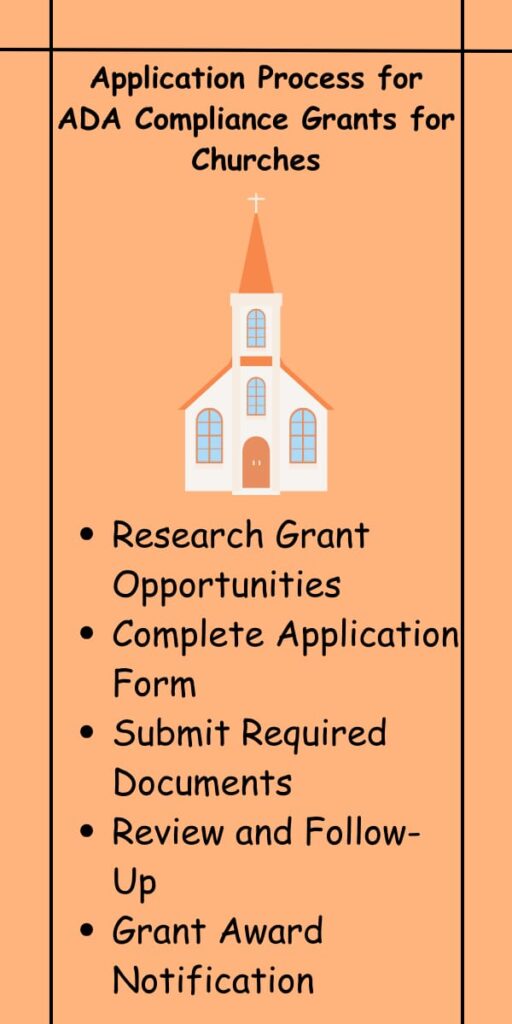
- Research Grant Opportunities: Churches should conduct thorough research to identify suitable grant opportunities from a variety of sources, including government agencies, private foundations, and nonprofit organizations. This may involve consulting online databases, attending grant workshops, or networking with other organizations in the community.
- Complete Application Form: Once potential grant opportunities are identified, churches must carefully complete the grant application form provided by the granting organization. It’s crucial to provide all required information accurately and thoroughly, paying close attention to any instructions or guidelines provided.
- Submit Required Documents: Alongside the application form, churches must submit all required documents, including proof of nonprofit status, architectural plans, budget proposal, and any additional documentation requested by the granting organization. It’s essential to ensure that all documents are properly formatted and organized for easy review.
- Review and Follow-Up: After submitting the application, churches may need to wait for a period of time while the granting organization reviews and evaluates their proposal. During this time, it’s important to remain proactive and responsive to any inquiries or requests for additional information and to follow up as needed to ensure that the application is progressing smoothly.
- Grant Award Notification: If the grant application is successful, churches will receive notification of the grant award, along with any conditions or requirements associated with the funding. If the application is unsuccessful, churches may seek feedback from the granting organization to improve future applications and explore alternative funding sources to support their accessibility initiatives.
What are the types of ADA Grants offered to Churches?
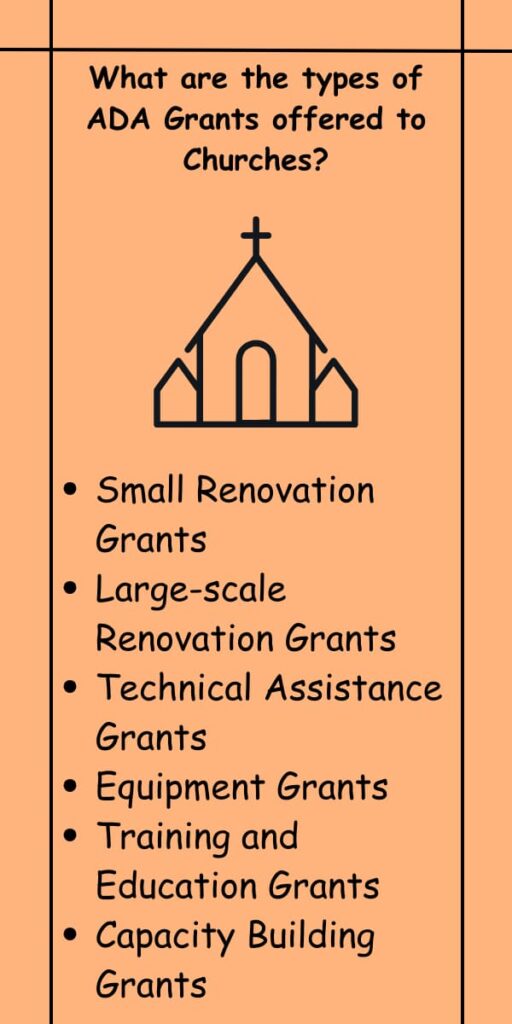
ADA grants offered to churches encompass a variety of funding opportunities tailored to support accessibility enhancements within religious institutions.
These grants are designed to address specific challenges faced by churches in achieving ADA compliance and fostering inclusivity. Some common types of ADA grants include:
- Small Renovation Grants: Small renovation grants focus on funding minor accessibility improvements within church facilities. This may include projects such as installing handrails along pathways, adding grab bars in restrooms, or widening doorways to accommodate wheelchairs. These grants are ideal for churches looking to make incremental improvements to their accessibility infrastructure.
- Large-scale Renovation Grants: Large-scale renovation grants provide substantial funding for significant accessibility projects that require extensive modifications to the church building. These grants are suitable for churches undertaking major renovation efforts to ensure full compliance with ADA regulations. Projects may include constructing ramps or lifts to provide access to elevated areas, modifying seating arrangements to accommodate wheelchair users or redesigning entrances to be wheelchair accessible.
- Technical Assistance Grants: Technical assistance grants offer financial support for churches to enlist the expertise of architects, engineers, or accessibility consultants. These professionals can assess the church’s current accessibility status, develop comprehensive plans for achieving ADA compliance, and provide guidance throughout the implementation process. Technical assistance grants are valuable for churches seeking expert advice to navigate complex accessibility requirements and ensure that renovations meet ADA standards.
- Equipment Grants: Equipment grants cover the cost of purchasing and installing specialized accessibility equipment within church facilities. This includes equipment such as assistive listening devices, wheelchair lifts, or automatic door openers. By providing funding for essential accessibility equipment, these grants help churches remove physical barriers and create more inclusive spaces for individuals with disabilities.
- Training and Education Grants: Training and education grants support churches in providing training and educational resources to their staff, volunteers, and congregation members. These grants may fund workshops, seminars, or training sessions focused on ADA compliance, disability awareness, and best practices for promoting inclusivity. Training and education grants empower churches to build a knowledgeable and inclusive community that values accessibility for all individuals.
- Capacity Building Grants: Capacity building grants provide funding for churches to strengthen their organizational capacity to implement ADA compliance initiatives effectively. This may involve investing in staff training, hiring additional personnel dedicated to accessibility projects, or acquiring technology and resources to support ongoing compliance efforts. Capacity-building grants enable churches to develop sustainable strategies for maintaining accessibility and inclusivity in the long term.
By offering a diverse range of grant options, organizations aim to address the multifaceted challenges faced by churches in achieving ADA compliance and creating truly inclusive environments for worship and community engagement.
List of Organizations That Offer ADA Grants for Churches
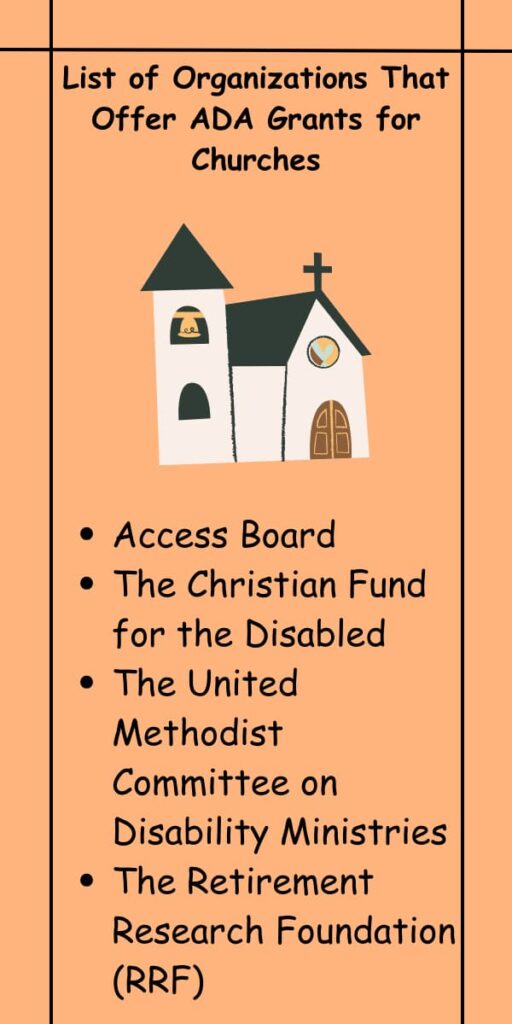
- Access Board: The Access Board is a federal agency committed to promoting accessibility and inclusion for individuals with disabilities. While they do not directly offer grants, the Access Board provides valuable resources, guidelines, and technical assistance to help churches and other organizations achieve ADA compliance. They offer guidance on ADA standards for accessible design and provide resources such as technical assistance manuals and online training courses to support accessibility efforts.
- The Christian Fund for the Disabled: The Christian Fund for the Disabled is a nonprofit organization dedicated to supporting individuals with disabilities and their families within the Christian community. They offer grants and financial assistance to churches seeking to make their facilities more accessible to individuals with disabilities. These grants may cover a range of accessibility enhancements, including ramps, elevators, accessible restrooms, and assistive technology. The Christian Fund for the Disabled also provides educational resources and advocacy support to help churches navigate the process of achieving ADA compliance.
- The United Methodist Committee on Disability Ministries: The United Methodist Committee on Disability Ministries is a faith-based organization that provides support and resources to United Methodist churches seeking to create more inclusive and accessible environments for individuals with disabilities. They offer grants, training programs, and consulting services to help churches assess their accessibility needs, develop ADA compliance plans, and implement necessary renovations or modifications. The committee also offers guidance on disability awareness and inclusion within the church community.
- The Retirement Research Foundation (RRF): The Retirement Research Foundation (RRF) is a nonprofit organization dedicated to improving the quality of life for older adults. While their primary focus is on supporting programs and initiatives that benefit seniors, they also offer grants to churches and religious organizations for projects that promote accessibility and inclusion for individuals with disabilities, including ADA compliance efforts. These grants may support renovations, equipment purchases, or educational programs aimed at enhancing accessibility within church facilities.
Conclusion:
In conclusion, several organizations offer ADA grants for churches to support their efforts in achieving accessibility and inclusion for individuals with disabilities.
From federal agencies like the Access Board to nonprofit organizations like The Christian Fund for the Disabled and The United Methodist Committee on Disability Ministries, these organizations provide valuable resources, funding, and guidance to help churches navigate the complex process of ADA compliance.
By securing ADA grants and leveraging the support and expertise of these organizations, churches can create welcoming and inclusive environments where all individuals, regardless of their abilities, can participate fully in worship and community activities.
[the_ad id=”39205″]
Frequently Asked Questions (FAQ):
What Is ADA Compliance, and Why Is It Important for Churches?
ADA compliance refers to adhering to the regulations set forth in the Americans with Disabilities Act, which mandates equal access and accommodation for individuals with disabilities. It’s crucial for churches to comply with ADA standards to ensure that all members of their congregation and the broader community can access their facilities and participate fully in worship and community activities.
What Types of Accessibility Improvements Do ADA Compliance Grants for Churches Typically Cover?
ADA compliance grants may cover a wide range of accessibility enhancements, including installing ramps, elevators, accessible restroom facilities, handrails, widened doorways, signage, assistive technology, and other modifications necessary to ensure compliance with ADA regulations.
How Can Churches Determine Their Eligibility for ADA Compliance Grants?
Churches must typically hold nonprofit status and demonstrate a need for accessibility improvements within their facilities. They may also need to show a commitment to ADA compliance and ensure that their proposed project aligns with the specific guidelines outlined by the granting organization.
What Documentation Is Required for Applying for ADA Compliance Grants?
Required documentation may include proof of nonprofit status, detailed architectural plans outlining proposed accessibility renovations, a comprehensive budget proposal, and evidence of community support for the project.
Where Can Churches Find ADA Compliance Grants?
ADA compliance grants may be offered by government agencies, private foundations, nonprofit organizations, and religious institutions. Churches can conduct research to identify suitable grant opportunities tailored to their needs and eligibility criteria.
What Support Resources Are Available for Churches Seeking ADA Compliance Grants?
Organizations such as the Access Board, The Christian Fund for the Disabled, The United Methodist Committee on Disability Ministries, and the Retirement Research Foundation (RRF) provide valuable resources, funding, and guidance to churches navigating the process of achieving ADA compliance.
How Long Does It Typically Take to Receive a Response After Applying for ADA Compliance Grants?
The timeline for receiving a response may vary depending on the granting organization and the volume of applications received. Churches should be prepared to wait for a period of time while the granting organization reviews and evaluates their application.
What Should Churches Do If Their Application for an ADA Compliance Grant Is Unsuccessful?
If an application is unsuccessful, churches may seek feedback from the granting organization to improve future applications and explore alternative funding sources to support their accessibility initiatives.
Are There Any Ongoing Requirements or Obligations Associated with Receiving ADA Compliance Grants?
Churches receiving ADA compliance grants may be required to fulfill certain reporting or compliance obligations outlined by the granting organization. It’s important for churches to understand and adhere to any terms or conditions associated with the grant funding.
How Can Churches Ensure That Their Facilities Remain ADA Compliant in the Long Term?
Churches can develop sustainable strategies for maintaining accessibility and inclusivity by implementing ongoing compliance efforts, providing staff training, conducting regular accessibility assessments, and staying informed about updates to ADA regulations and best practices.
Leave a Reply